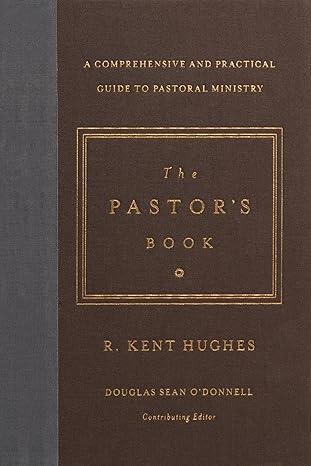A Brief Book Summary from Books At a Glance
by Steve West
Table of Contents
Part 1: Christian Gatherings
- Sunday Worship
- Annual Services
- Weddings
- Funerals
Enrichment: Poetry to Enhance Preaching and Worship
Part 2: Parts of the Worship Service
- Public Prayers
- The Historic Christian Creeds
- Hymns and Songs
- Baptism
- Communion
Part 3: Ministerial Duties
- Pastoral Counseling
- Hospital Visitation
Appendix: Sample Wedding Services from Various Churches
Note on the Summary
The Pastor’s Book is a very helpful resource for pastors and ministry leaders. It contains a wealth of sample sermons, service outlines, hymns, Christian songs, poems, and other material that can help pastors shape worship services, funerals, and weddings. Given the nature of sample services, hymns, etc., this summary does not summarize that material or the two chapters in Part 3 of this book. The reader of The Pastor’s Book will find a goldmine of responsible and helpful samples in every section of Hughe’s work.
Summary
Chapter 1: Sunday Worship
The worship of our great God is the church’s highest calling, yet far too often we do not reflect on why we are gathering on Sunday mornings, or on the elements that are found in our worship services. We need to ensure that our corporate gatherings are not merely entertainment. As we are taught in the New Testament, worship is all of life, and corporate worship is one aspect of this reality. Private worship does not preclude corporate worship, and when the church gathers they are to exalt Christ, edify believers, and have an evangelistic purpose in winning the lost. If Christ is not lifted up, no one can be edified or saved. Our worship needs to be trinitarian, glorifying Father, Son, and Spirit. We need to balance God’s transcendence and immanence, and celebrate our salvation through Christ’s life, death, and resurrection. Worship is reserved for God alone, and we can only worship and love him because he first loved us.
Our church services need to show the fear of the Lord, and the Word needs to be prayed, read, preached, and sung. It is imperative that our services focus on the expository preaching of the Word of God, and that God reverenced for his majesty. Far too many contemporary services are irreverent and trite. In Ecclesiastes, a major point is that we must learn to fear God. The teacher warns his readers to guard their steps when they go near the house of the Lord: they must be reverent. God is holy and he judges the way we worship. He knows our hearts, so we must approach him with reverence, awe, fear, and the boldness of faith. The teacher wrote that people should go near to God to listen to him, rather than speak many words in rashness. It is the Word of God, not the words of the worshiper, that takes priority. There is a time, however, when the worshiper is to speak to God; first we listen, then we respond. A huge problem in our culture and our churches is that we do not fear God properly, and we speak before we listen.
In the book of Nehemiah, we see that God built his people as they built the city wall. Chapter 8 of Nehemiah highlights how “God’s people love, learn, and live his law.” The focus was on the Word of God in their corporate gathering; it was read and explained day after day. The people responded to it with heartfelt “amens,” and they cried in repentance and rejoiced in salvation. They were also organized—all churches have some level of organization, and even those that protest they are fully Spirit-led can be rigid in their structure of spontaneity. In Nehemiah, after hearing the Word the people responded with action. We are to implement the truths of the Word in ethics and life. Although there is no prescribed liturgy in Scripture, we should aim for tota et al Scriptura (“by the Scripture alone, and by all of Scripture”).
Jesus attended synagogue, and although liturgy wasn’t prescribed in Scripture for such gatherings, they centered on the Word and prayer. It was this basic structure that the early church assumed in their gatherings. In the Reformation, Reformed churches strove to regulate all of their worship services according to Scripture. A study of liturgies from different traditions and eras in church history reveals four common elements: reading and singing of Scripture; prayer according to Scripture; a sermon on Scripture; the Lord’s Supper formed on Scripture. Like those in the past, we are to reflect deeply on our worship services, and put the Word in the primary place. Thankfully, it seems that many younger believers are turning once again to a more thoughtful engagement with the forms and elements of worship services. The Word must not only inform our worship services, it must comprise our worship. . . .
[To continue reading this summary, please see below....]The remainder of this article is premium content. Become a member to continue reading.
Already have an account? Sign In
